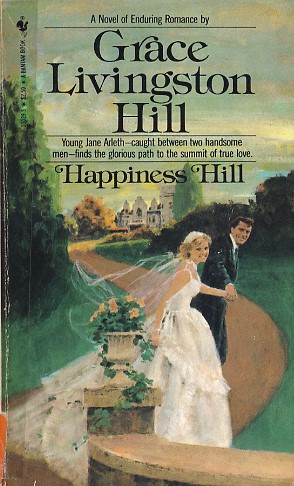Grace Livingston Hill (April 16, 1865 - 1947)

Grace Livingston Hill (1865-1947) was born on April 16, 1865 to a Presbyterian Minister, Charles and a published author, Marcia Macdonald, in Wellsville, New York. She was an early 20th century "Christian Romance" novelist. She was immensely popular in the time that she wrote, contributing hundreds of novels and short stories during her lifetime. Her characters were most often young female ingénues, frequently strong Christian women or those who become so within the confines of the story.
Hill's messages are quite simplistic in nature: good versus evil. As Hill believed the Bible was very clear about what was good and what was evil in life, she reflected that cut-and-dried design in her own works. She wrote about a variety of different subjects, almost always with a romance worked into the message and often essential to the return to grace on the part of one or several characters.
If her clear-cut descriptions of evil in man and woman were Ms. Hill’s primary subjects in her novels, a secondary subject would always be God’s ability to restore. Grace touched on subjects such as infidelity, defiance, hard-heartedness towards God, and deception, to name just a few. Grace wrote about them all and could manage a happy, or at least satisfactory, ending to any situation. Jesus, the ever-present (though unseen) recurring character, manages to heal or mend any situation Grace imagined.
Although many of her novels read like entertaining and engaging sermons, Grace also wrote pure and simple adventures. Grace never forgot her holy master in her life’s work and was a master of her own pen in writing stories that enchanted their readers and taught lessons at the same time. It was no wonder that in her day she was known as the “Queen of Christian Romance". The last Mrs. Livingston Hill's book, Mary Arden, was finished by her daughter Ruth Livingston Hill and published in 1947.
Today people have not forgotten Grace Livingston Hill’s achievements. While she is not the household name she was, her books are still in circulation, many being available in compilation novels. Her messages, so clear and simple, are easily adaptable to our society today and can be appreciated equally now as they were when she wrote them. Her youngest grandson, Munce, is credited with having said that given the opportunity to pay tribute to her own career, Grace would have merely said, "Thank you, God, for using me".
Source: http://en.wikipedia.org/wiki/Grace_Livingston_Hill